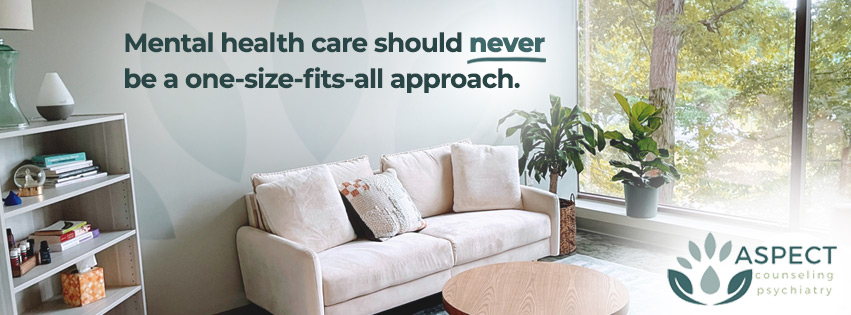If you’re looking for ERP therapy in Richmond, VA to treat your anxiety, OCD, or PTSD, our licensed therapists are here to help.
At Aspect Counseling and Psychiatry, we have therapists & board-certified nurse practitioners to provide a continuity of care that most therapy practices don’t provide.

- We’re available for in-person ERP therapy in Richmond, VA, as well as telehealth sessions throughout Virginia
- We have 9 ERP therapists on staff so you can find the best fit for you
- We never take a one-size-fits-all approach; every client is unique
- Our PMHNPs work in conjunction with our therapists to diagnose conditions and manage medications, if needed
If you’re still wondering whether ERP therapy is right for you, let’s discuss what it is, its benefits, and the types of conditions it is commonly used to treat.
- What Is ERP Therapy?
- The Benefits of ERP
- How Our ERP Therapists Can Help
- The Conditions That ERP Can Treat
- What to Expect During an ERP Session
- ERP Therapists in Richmond, VA
- ERP Therapy FAQs
- Our Therapy Office
- Start ERP Therapy Near You, Today
What Is ERP Therapy?
Exposure and Response Prevention (ERP) therapy is a highly effective form of behavioral therapy that helps individuals face their fears and reduce compulsive behaviors.
ERP is known as the gold standard treatment for OCD, but it’s also widely used to help with anxiety disorders, as well as other mental health conditions.
Instead of avoiding triggers, ERP gently guides you through them in a safe, structured way, helping you build resilience and confidence.
If you’re searching for ERP therapy near you in Richmond, VA, our compassionate therapists are here to help.
The Benefits of ERP
ERP is one of the most research-backed forms of therapy, offering significant, lasting improvements for clients. Benefits include:
- Reduced anxiety and fear responses
- Decreased reliance on compulsive rituals
- Greater control over intrusive thoughts
- Improved emotional regulation
- Better coping skills in stressful situations
- Long-term symptom relief
With consistent practice, ERP empowers clients to break free from cycles of fear and avoidance.
How Our ERP Therapists Can Help
Our licensed ERP therapists in Richmond provide individualized treatment tailored to your specific needs. We create a safe, supportive environment where you can gradually confront difficult thoughts and situations without resorting to old habits. Whether you’re dealing with OCD, anxiety, or trauma, our goal is to help you regain control and live a more fulfilling life.
In addition to therapy, our board-certified psychiatric nurse practitioners (PMHNPs) can work with your therapist to order lab tests, diagnose specific conditions, and prescribe & manage medications.
At Aspect Counseling and Psychiatry, we’ve got you covered from every angle.
The Conditions That ERP Can Treat
ERP therapy is effective for a range of conditions, including:
- Obsessive-Compulsive Disorder (OCD)
- Anxiety disorders (generalized anxiety, panic disorder, phobias)
- Eating disorders
- Depression with obsessive features
If you’re struggling with any of these issues, our therapists can help you explore whether ERP treatment is the right fit.
ERP Treatment for OCD
ERP is considered the leading treatment for OCD. It works by exposing you to triggers that normally bring on obsessions or compulsions, while helping you resist the urge to perform rituals. Over time, this reduces the power of intrusive thoughts and makes it easier to live without compulsive behaviors.
ERP Treatment for Anxiety
For anxiety disorders, ERP teaches you how to face situations that normally cause distress without avoiding them. By staying present with the anxiety and not escaping, your brain learns that the feared outcome is less threatening than you imagined. This gradually reduces overall anxiety levels.
What to Expect During an ERP Session
In an ERP session, you’ll work closely with your therapist to identify your triggers and create a personalized treatment plan. Sessions typically include:
- Discussion of your symptoms and goals
- Gradual exposure exercises, starting with less intense triggers
- Support and coaching to resist compulsive or avoidance behaviors
- Reflection and skills practice to carry into daily life
ERP sessions are always collaborative—you’ll move at a pace that feels manageable while still making progress.
ERP Therapists in Richmond, VA
Aspect Counseling and Psychiatry employs 9 ERP therapists, most of whom have extensive experience with exposure response treatment. Here’s a list of all our ERP therapists.
Click on a therapist to learn more about them & schedule your first session.

Amber Zarger
LCSW

Carla Crews
LCSW

Gabby Scalzo
PhD, LCP
Hunter Worsham
LPC

Josh Barefoot
LPC

Kristina Gilbert
LPC

Laurie Manns
LPC, CSAC

Lindsey Bowers
LPC

Robyn D’Reaux-Rodgers
LCSW

Shenika Whitaker-Carlos
LCSW, CSOTP
ERP Therapy FAQs
You might find these answers helpful if you’re just getting started and want to learn more about ERP therapy at our office in Richmond.
The length varies, but many clients see significant progress in 12–20 sessions, depending on the severity of symptoms.
Yes. Our office accepts many forms of insurance, including medicare. Check our insurance page for a complete list of insurance providers.
ERP can be challenging, since it involves facing fears directly. However, your therapist will provide step-by-step guidance to make the process safe and manageable.
Yes. ERP is often combined with CBT, medication management, or mindfulness practices for the best results.
Yes, our ERP therapists in Richmond work with both adults and teens struggling with OCD, anxiety, or other mental health concerns.
Our Therapy Office
Our therapy office is located in the heart of West End Richmond, in the Innsbrook business complex—at the crossroads of I-64, I-295, Hwy 288, and West Broad St. We share the Liberty Plaza I building with several law offices, financial services companies, and other Richmond-area businesses, at the corner of Cox Rd. & North Park Dr.
4801 Cox Road, Suite 205
Glen Allen, VA 23060
Directions →

Start ERP Therapy Near You, Today
If you’re searching for “ERP therapy near me”, our team of experienced therapists is here to help. ERP is a powerful, evidence-based treatment that can bring real relief.
Don’t let OCD, anxiety, or trauma hold you back—contact us today to schedule an appointment and start your healing journey.
